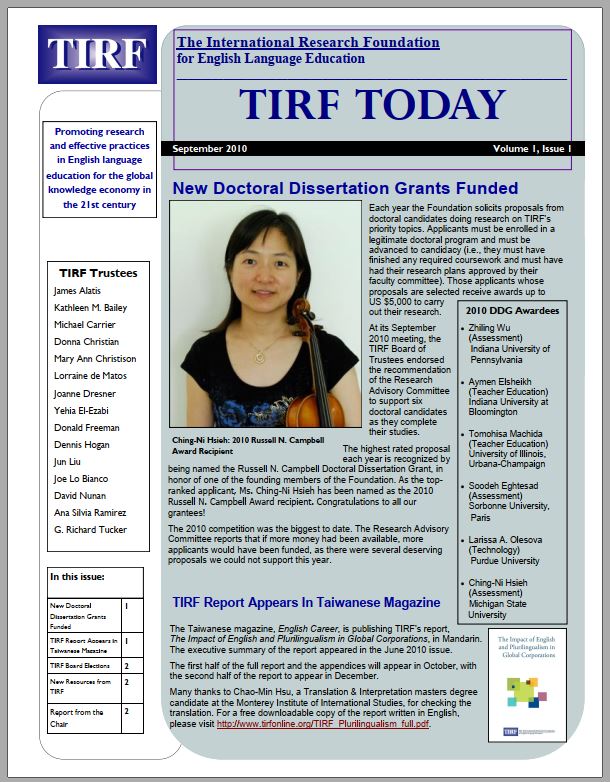At this time of year, I often think about why August seems to go so fast. Wasn’t it just June? Wasn’t it last week that I was making plans for the projects I’d get done this summer? Now the summer is over, the projects are not finished, the new school semester is about to start, and I’m writing my last Chair’s Report for TIRF Today.
As you saw in our June newsletter, I am stepping down as the President of TIRF and the Chairman of the Foundation’s Board of Trustees. Our new President, my friend and colleague, Dr. Jun Liu, will take over at the end of our September Board meeting.

Of course, it is with mixed feelings that I prepare for the many changes involved in this transition, but there is one emotion that is pure relief: This is my last newsletter Chair’s Report.
Please don’t get me wrong: I thoroughly enjoy volunteering for TIRF, including communicating with the Foundation’s many stakeholders around the world. What is a relief, however, is not having to write the Chair’s Report – a task which, while sometimes enjoyable, has been a source of anxiety to me for the last week of every month for the past 13 years.
Those of you who know me or know of my academic work may wonder why writing short, newsy stories and TIRF updates would be so stressful. After all, I’ve written books, chapters, articles, and even a few editorials. I have written newsletter pieces as the President of both AAAL and TESOL. So what makes writing the Chair’s Report for TIRF Today different?
First, no one is compelled – personally, politically, or professionally – to read the Chair’s Report, so I have to try to make it interesting and appealing. (I try to make chapters and articles and books interesting and appealing too, but my students are often required to read them.) But to whom should I appeal? Who is it I am trying to interest? TIRF Today has a very wide international audience, about which I know very little. As noted in last month’s Chair’s Report, we had about 250 readers when Ryan Damerow, TIRF’s Chief Operating Officer, and I started producing the newsletter in September of 2010, but we estimate now that the newsletter reaches about 13,000 readers each month. Well, let’s say it reaches them digitally – but whether or not it reaches them intellectually or emotionally is another matter.
This issue leads me to my second point: Writing to a wide, general, and largely unknown audience is really difficult! It’s much easier to write a research report or a literature review, where the genre is familiar, the readership is predictable, and the topics are presumably of interest to that self-selected reading audience.
Before I continue, I’m going to digress and think about the meaning of last before adding to my list of challenges. The Etymology Online Dictionary provides the following background to the word last, when it is used as an adjective:
c. 1200, “latest, final, following all others,” a contraction of Old English latost (adj.) “slowest, latest,” superlative of læt (see late); in some uses from late (adv.). Cognate with Old Frisian lest, Dutch laatst, Old High German laggost, German letzt.
In thinking about the meaning of last, I realized that the word is often used in titles – for example, the title of the book, The Last of the Mohicans, written by James Fenimore Cooper (supposedly an ancestor of mine), which was published in 1826. A more recent book is simply called The Last: A Novel. Written by Hanna Jameson and published in 2019, it is described on Amazon.com as a “breathtaking dystopian psychological thriller” that
follows an American academic stranded at a Swiss hotel as the world descends into nuclear war—along with twenty other survivors—who becomes obsessed with identifying a murderer in their midst after the body of a young girl is discovered in one of the hotel’s water tanks.
As fond as I am of mysteries, I think I’ll pass on this one. I’d probably identify too strongly with the American academic caught up in “a dystopian psychological thriller.” If the quote above interests you and you decide to buy the book, please remember to use Amazon Smile, with The International Research Foundation for English Language Education designated as your charitable organization in order for TIRF to receive a percentage of your purchase price.

It turns out that the adjective form of last features in the names of many movies as well: The Last Picture Show, The Last Samurai, The Last Duel, The Last Dance, The Last Kingdom, The Last Czars, The Last of the Dogmen, The Last Summer, Last Night in Soho, Transformers: The Last Knight, The Last Action Hero, The Last Bus, The Last Letter from Your Lover, The Last Man Down, and even The Last Kids on Earth. I’ve recently been watching episodes of The Last Tango in Halifax (which is nothing at all like The Last Tango in Paris).
There is sometimes a certain sentimentality associated with the use of last in a phrase. For example, Pacific Grove, California is a small town where I used to live. It is referred to as “the last hometown.” I’m not sure why, except that it’s small and friendly and many of the houses are quaint.
There is even a pizza company whose slogan says their product is “the last honest pizza.” Hearing their advertisements always makes me wonder – what is an “honest pizza” anyway?
There are also many familiar formulaic expressions that use the adjective: “the last breath,” “good to the last drop,” “the last laugh,” “the last hurrah,” “the last word,” “the last man standing” (which was also used as the title of an American TV series), “the last man on earth” (also the title of a TV series), and “at last” (which is also the title of a song by Harry Warren and most famously sung by Etta James).
But let’s look at another meaning of the word last: As a verb, to last means to continue. Other synonyms include persevere, endure, stand firm, remain, and persist. And thinking about these meanings has led me to ponder the future of TIRF and to return to my main theme – the reasons why writing the Chair’s Report has caused me so much anxiety over the years.
The third reason why writing the monthly Chair’s Report is stressful is that I have typically tried to use the text to encourage readers to donate to TIRF. Asking for money is never easy. Asking teachers and researchers for money is downright ridiculous – especially as we attempt to transition out of COVID times and try to return to some sense of normalcy in our work.
And yet, if the Foundation is to last, it must have financial support.
There are many ways you can help. As mentioned above, purchases on Smile.Amazon.com generate income for TIRF if you designate the Foundation as your charity of choice. If your employer has a gift-matching plan, it can substantially increase your donation. Some of our stakeholders write checks drawn on U.S. banks, while others donate online via our website. Our online donation platform allows supporters to sign up for automatic monthly giving or one single gift. There are a handful of TIRF supporters who are subject to the U.S. tax system, and who (like me) are growing older and donate to TIRF annually through their required minimum distributions from their IRAs. And at least one supporter has designated TIRF as the beneficiary on their life insurance policy. All these forms of donating to TIRF are incredibly kind and greatly appreciated.
So I’ll now conclude this last Chair’s Report (“At last!” you may be thinking) by thanking the readers of TIRF Today – especially those of you who have been able to support the Foundation financially. I also want to express my gratitude to those readers who have emailed me from time to time to share an anecdote or tell me about their responses to what I had written. It means a great deal to know that someone is reading and perhaps my writing has, in fact, touched some individuals personally.
Best wishes,


